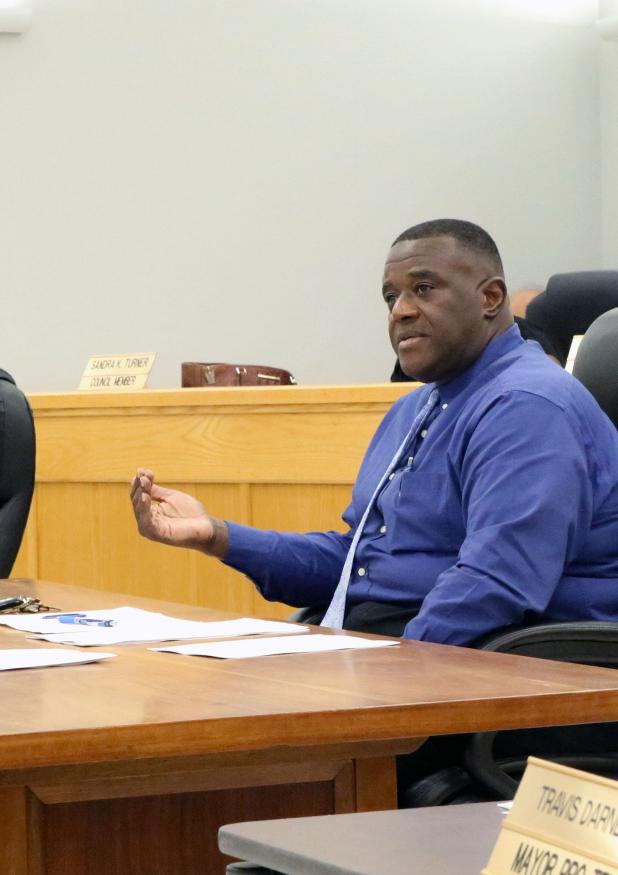
Patterson Mayor Rodney Grogan is interviewed in the first episode of the Small Town Podcast.
The Daily Review/Bill Decker
From the Editor: Patterson mayor interviewed for new podcast
Patterson is entering the podcast universe.
Patterson Mayor Rodney Grogan has been interviewed by Mayor Matt Seale of Ocilla, Georgia, for the Small Town Podcast, a partnership between the Louisiana Municipal Association and Louisiana Economic Development.
According to a press release, “Mayor Grogan discusses what it’s meant to serve as the first African-American mayor in Patterson and his life leading up to this great honor. Grogan also discusses the efforts being made in revitalizing the great small town of Patterson.”
The podcast became available for streaming or download Monday. Click here to find the podcast webpage.
Podcasts have been around for nearly 20 years, but they’re like opera or liver and onions: You either love them or you don’t acknowledge their existence. For the latter category, podcasts are like radio shows that you can download or stream anytime you want. Generally you can listen to them on the web or use an app like Apple Tunes, Spotify and Stitcher.
Some podcasts are just re-airing of news shows you’d see on Fox News or MSNBC. Some are old-fashioned radio dramas.
Some are devoted to fans rehashing episodes of new or classic TV shows like "The Americans" or "Law & Order." And some are dedicated to hobbies like sewing, boating or amateur radio.
Podcasts have become famous in their own right, like Serial, a true-crime exploration of the conviction of a high school student for killing a classmate. True crime is huge in the podcast world.
Some people have become famous for hosting popular podcasts, such as Joe Rogan.
As you might expect, our weird and wonderful state has been the focus of some special podcasts.
Duking it out
Josh Levin, a New Orleans native who is now national editor for Slate, explored the rise of David Duke in the fourth season of Slate’s Slow Burn podcast.
The Slate blurb about Slow Burn says Levin explores “how a Nazi sympathizer and former Klansman fashioned himself into a mainstream figure, and why some voters came to embrace his message. It will also examine how activists, journalists, and ordinary citizens confronted Duke’s candidacy, and what it took to stop him.”
The series focuses on the political tap-dancing over whether and how state Republicans would support or not support Duke in his 1991 gubernatorial campaign, the one featuring the infamous “runoff from hell” pitting Duke against Edwin Edwards.
The podcast includes interviews with Edwards and the late Beth Rickey, the south Louisiana Republican who did much of the early research into Duke’s ties to the Klan and neo-Nazis.
The podcast is worth hearing in the present day, when national politics wrestles over which side is being radical and what to do about it.
Slow Burn’s other seasons have been devoted to stories including Watergate, the Clinton impeachment and, currently, the run-up to the 2003 invasion of Iraq.
Click here to find the Slow Burn Season 4 page.
The Bulldog
Another ear-opening podcast is Deep Cover, which begins — but only begins — with the notorious Bulldog marijuana smuggling case from the 1980s.
An abandoned barge was found in 1983 at a Vermilion Parish shipyard near a community called Bancker. Inside were the water- and oil-spoiled remnants of what had been an estimated 280,000 pounds of marijuana.
Five years later, a federal grand jury in Louisiana handed down indictments alleging that millions of pounds of marijuana and cocaine were smuggled into the state, and that the proceeds were laundered by none other than Panamanian dictator Manuel Noriega.
The drug-smuggling and money-laundering accusations played a role the next year in the decision by President George H.W. Bush to invade Panama and depose Noriega.
Among those interviewed for the early stages of the podcast was Roy Frusha, who was head of Louisiana State Police Region II Narcotics when I covered state police in the early 1990s.
Frusha, who wasn’t yet the Region II Narcotics commander in 1983, describes climbing down into the barge, finding the dope dregs and tracking the smugglers who had stayed in the Bancker area during the off-loading. Utility bills helped investigators figure out what had been going on.
Click here to go to the Deep Cover website.
Frusha, by the way, wrote “Wrestling With Pigs,” a fictionalized account of the case and the politics that followed in its wake. The title comes from a George Bernard Shaw quote: “Never wrestle with pigs. You’ll both get dirty and the pig likes it.”
Bill Decker is managing editor of The Daily Review.
